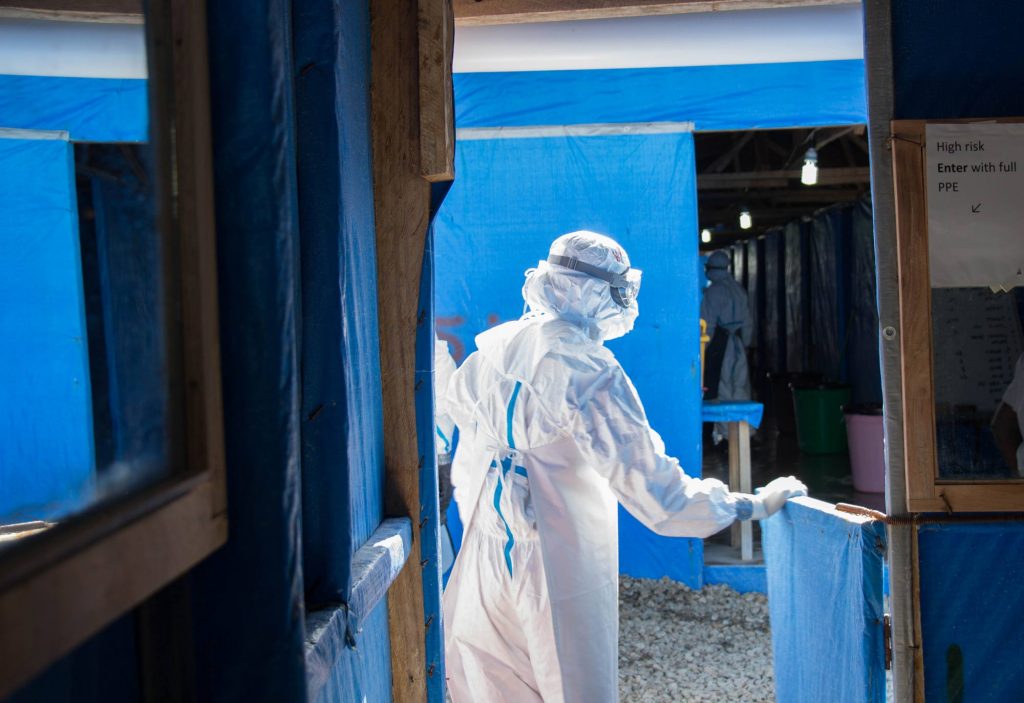
2014–2016
Fighting Ebola in West Africa
Fighting Ebola in West Africa 2014 – 2015
After 28,000 cases and 11,000 deaths, the West Africa Ebola outbreak—the largest and deadliest in history—officially ended in late 2015 when Guinea was finally declared Ebola-free after two years of fighting the virus. One of the few international NGOs to treat patients afflicted with the virus at the source of the 2014 outbreak in West Africa, we worked in all three high-transmission countries (Guinea, Sierra Leone, and Liberia) and cared for more than 460 Ebola-positive patients through five Ebola treatment facilities. We also worked in Mali and Guinea-Bissau to help prepare health systems to detect and respond to any suspected cases.



Our Response

Treatment
At the height of the epidemic, International Medical Corps operated five Ebola Treatment Units in two countries, Liberia and Sierra Leone. The facilities cumulatively cared for more than 2,500 patients, including 460 Ebola-positive patients. Ebola-related programs, such as the establishment of rapid response teams and IPC training, spanned five West African countries, including the three nations at the heart of the outbreak, Guinea, Sierra Leone and Liberia. We also operated in Mali, which suffered a brief, minor outbreak late last year, and in Guinea-Bissau, which remained Ebola-free but is considered vulnerable to the epidemic.

Training
International Medical Corps provided high-quality training for local staff, partners, and other NGOs. Together with Massachusetts General Hospital, International Medical Corps developed a curriculum drawing from groups including the World Health Organization and the Centers for Disease Control and Prevention. The resulting curriculum provides a broad-based training strategy to inform, protect, and guide health workers unfamiliar with the Ebola Virus Disease.

Rebuilding Health Care Infrastructure
International Medical Corps worked in Liberia, Sierra Leone, Guinea, Guinea-Bissau, and Mali to strengthen local health care systems and lift the overall level of care and to better prepare these nations for future public health emergencies, including Ebola. We supported screening and referral units (SRUs) at hospitals and clinics, which require all staff, patients and visitors to be screened for Ebola-like symptoms prior to entering the facility. Anyone exhibiting signs of the virus is isolated and referred for further observation, testing and—if needed—treatment. We provided material and technical support to health facilities to ensure that they are better equipped to respond to a potential resurgence of Ebola or another infectious disease, treat survivors, and effectively provide better day-to-day care.

Mental Health
We played a key role in providing psychosocial support, counselling, and care to admitted Ebola patients, survivors and their families. As the outbreak ended, our psychosocial specialists continued to reach out to local communities to discuss the myths that surround Ebola and the importance of seeking medical attention if ill. They also worked to promote integration of Ebola survivors.

Research
The recent Ebola outbreak prompted International Medical Corps to begin the EVD Research Project, which conducts clinical and social science research related to EVD. Our research contributes to global learning for improved response capacity and management of pandemics and epidemics and informs our own future work.
The EVD Research Project utilizes existing data routinely collected in International Medical Corps Ebola treatment facilities in the context of patient care, laboratory testing, and epidemiologic investigations to analyze the effectiveness of different diagnostic and treatment strategies. This analysis then contributes to evidence-based guidelines for the comprehensive management of patients with suspected and confirmed EVD.
All International Medical Corps EVD data is available to external scientific researchers by application. Guidelines are found HERE.